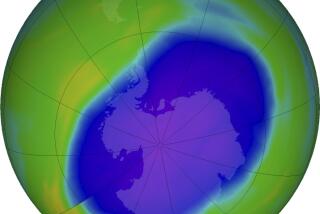Limiting the Ozone Damage
- Share via
Not long ago the ozone hole seemed to be one of those remote environmental issues that might affect some remote future generation. But the problem of ozone depletion in the atmosphere is no joking matter. Results of the latest scientific study show that this is a serious environmental problem--here and now.
The study released Tuesday is testimony not only to the severity of the ozone hole over the Antarctic, affected by fluctuating atmospheric conditions peculiar to the southern polar region, but also to depletion of ozone in the atmosphere in general. The ozone layer ranging from nine to 30 miles above the Earth’s surface shields the planet from harmful ultraviolet rays from the sun.
Scientists are now certain that the major cause of ozone depletion is the release into the atmosphere of chlorofluorocarbons--industrial chemicals used in refrigerators, air conditioners and plastic insulating foam as well as aerosol propellants--except where they already are banned. The immediate health threat is that depletion of ozone exposes humans to higher levels of ultraviolet light and therefore increases the risk of skin cancer. But the phenomenon may have other far-reaching global effects--such as on the growth of plankton, the base for the food chain of marine animals and birds.
By coincidence, the Senate on Monday voted 83 to 0 to ratify an international treaty to freeze the production of chlorofluorocarbons and roll back output by 50% by the end of the century. Mexico is the only other nation to ratify so far. The treaty does not become effective until approved by at least 11 nations accounting for two-thirds of global production and consumption.
But the treaty is only a first step. The chemicals are extremely long-lived in the atmosphere. Ozone depletion would continue even if all uses of chlorofluorocarbons were stopped immediately. It is essential that the treaty go into effect as soon as possible. Then work should begin on further negotiations to provide even greater reductions of the chemicals. And more study of the global environment is needed because, as a scientist for the Environmental Defense Fund put it, “we ought to expect other nasty surprises.”





